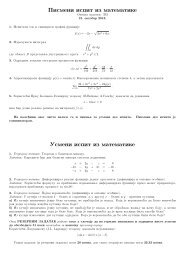WHITE BOOK 2004 EBU Tournament Directors' Guide Edited by ...
WHITE BOOK 2004 EBU Tournament Directors' Guide Edited by ...
WHITE BOOK 2004 EBU Tournament Directors' Guide Edited by ...
Create successful ePaper yourself
Turn your PDF publications into a flip-book with our unique Google optimized e-Paper software.
White Book – November 2003 – Chapter IV<br />
12.1.3 Split scores<br />
Law 12C2 refers to the fact that scores need not balance. There are several occasions<br />
when a TD should give the two sides different assigned scores.<br />
(a) The actual basis given in Law 12C2 for the two sides is different. The nonoffenders<br />
get the best result that was likely had the irregularity not<br />
occurred. The offenders get the worst score that was at all probable.<br />
Example Suppose 1NT is doubled and then the defence take it out<br />
because they are told it was a strong 1NT. In fact it is weak,<br />
and the TD decides to assign a score in 1NT doubled. Three<br />
off seems a likely result. While four off is not likely, it might just<br />
happen, because it depends on a particular defence and a misguess.<br />
So the TD gives the non-offending side 1NTx-3, but for<br />
the offending side he assigns 1NTx-4.<br />
In fact this procedure is now very rare and not recommended. When more<br />
than one conclusion is possible it is normal now to give a weighted score,<br />
see #12.1.4.<br />
(b) Suppose a player knows his opponents have done something wrong. They<br />
reach a final contract, and he judges that he will get an adjustment anyway.<br />
So he decides to try a gambling double: if he gets a good score, that is fine:<br />
if not, then he will presumably get an adjustment anyway.<br />
This is known as the ’double shot‘, permitted in many sports, but not<br />
acceptable in bridge. The player's final score is considered to be caused<br />
<strong>by</strong> the ‘wild or gambling action’ subsequent to the opponent's infraction so<br />
is not adjusted. However, the score for the offending side is adjusted in the<br />
normal way.<br />
Example A Ghestem jump overcall of 3 over 1 is described as hearts<br />
and diamonds. Overcaller looks surprised at his partner's<br />
explanation, and bids 3 over his partner's 3 and then 4<br />
over 4. No doubt this will be ruled back since he appears to<br />
have used unauthorised information. But an opponent makes a<br />
ridiculous double of 4, which makes.<br />
The offenders get adjusted back to some contract in hearts. If<br />
the doubler's action is considered "wild or gambling" then the<br />
non-offenders keep their table score of 4 doubled making.<br />
(c) Under Law 82C when a TD has made an error which is too late to correct,<br />
he will assign a score to each side. Since he is required to treat both sides<br />
as non-offending these scores will often not balance.<br />
Example A player bids 3, and then is told that he has been<br />
misinformed. The TD is called but fails to give him a chance to<br />
change his bid. He makes ten tricks and afterwards claims that<br />
he would have bid 4 with the correct information. If the TD<br />
feels that he might or might not have bid 4 he should assign<br />
4 making to this player but 3 plus one to his opponents.<br />
(d) In the next section we deal with "weighted" scores: it is also possible to get<br />
a score that is both split and weighted – see #12.1.5.<br />
23





